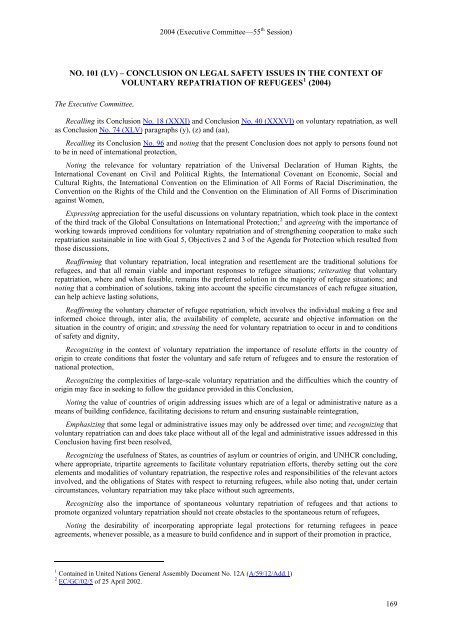CONCLUSIONS ADOPTED BY THE EXECUTIVE ... - UNHCR
CONCLUSIONS ADOPTED BY THE EXECUTIVE ... - UNHCR
CONCLUSIONS ADOPTED BY THE EXECUTIVE ... - UNHCR
You also want an ePaper? Increase the reach of your titles
YUMPU automatically turns print PDFs into web optimized ePapers that Google loves.
2004 (Executive Committee—55 th Session)<br />
NO. 101 (LV) – CONCLUSION ON LEGAL SAFETY ISSUES IN <strong>THE</strong> CONTEXT OF<br />
VOLUNTARY REPATRIATION OF REFUGEES 1 (2004)<br />
The Executive Committee,<br />
Recalling its Conclusion No. 18 (XXXI) and Conclusion No. 40 (XXXVI) on voluntary repatriation, as well<br />
as Conclusion No. 74 (XLV) paragraphs (y), (z) and (aa),<br />
Recalling its Conclusion No. 96 and noting that the present Conclusion does not apply to persons found not<br />
to be in need of international protection,<br />
Noting the relevance for voluntary repatriation of the Universal Declaration of Human Rights, the<br />
International Covenant on Civil and Political Rights, the International Covenant on Economic, Social and<br />
Cultural Rights, the International Convention on the Elimination of All Forms of Racial Discrimination, the<br />
Convention on the Rights of the Child and the Convention on the Elimination of All Forms of Discrimination<br />
against Women,<br />
Expressing appreciation for the useful discussions on voluntary repatriation, which took place in the context<br />
of the third track of the Global Consultations on International Protection; 2 and agreeing with the importance of<br />
working towards improved conditions for voluntary repatriation and of strengthening cooperation to make such<br />
repatriation sustainable in line with Goal 5, Objectives 2 and 3 of the Agenda for Protection which resulted from<br />
those discussions,<br />
Reaffirming that voluntary repatriation, local integration and resettlement are the traditional solutions for<br />
refugees, and that all remain viable and important responses to refugee situations; reiterating that voluntary<br />
repatriation, where and when feasible, remains the preferred solution in the majority of refugee situations; and<br />
noting that a combination of solutions, taking into account the specific circumstances of each refugee situation,<br />
can help achieve lasting solutions,<br />
Reaffirming the voluntary character of refugee repatriation, which involves the individual making a free and<br />
informed choice through, inter alia, the availability of complete, accurate and objective information on the<br />
situation in the country of origin; and stressing the need for voluntary repatriation to occur in and to conditions<br />
of safety and dignity,<br />
Recognizing in the context of voluntary repatriation the importance of resolute efforts in the country of<br />
origin to create conditions that foster the voluntary and safe return of refugees and to ensure the restoration of<br />
national protection,<br />
Recognizing the complexities of large-scale voluntary repatriation and the difficulties which the country of<br />
origin may face in seeking to follow the guidance provided in this Conclusion,<br />
Noting the value of countries of origin addressing issues which are of a legal or administrative nature as a<br />
means of building confidence, facilitating decisions to return and ensuring sustainable reintegration,<br />
Emphasizing that some legal or administrative issues may only be addressed over time; and recognizing that<br />
voluntary repatriation can and does take place without all of the legal and administrative issues addressed in this<br />
Conclusion having first been resolved,<br />
Recognizing the usefulness of States, as countries of asylum or countries of origin, and <strong>UNHCR</strong> concluding,<br />
where appropriate, tripartite agreements to facilitate voluntary repatriation efforts, thereby setting out the core<br />
elements and modalities of voluntary repatriation, the respective roles and responsibilities of the relevant actors<br />
involved, and the obligations of States with respect to returning refugees, while also noting that, under certain<br />
circumstances, voluntary repatriation may take place without such agreements,<br />
Recognizing also the importance of spontaneous voluntary repatriation of refugees and that actions to<br />
promote organized voluntary repatriation should not create obstacles to the spontaneous return of refugees,<br />
Noting the desirability of incorporating appropriate legal protections for returning refugees in peace<br />
agreements, whenever possible, as a measure to build confidence and in support of their promotion in practice,<br />
1<br />
Contained in United Nations General Assembly Document No. 12A (A/59/12/Add.1)<br />
2<br />
EC/GC/02/5 of 25 April 2002.<br />
169
















